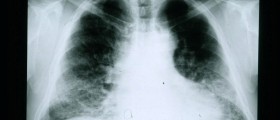
The severity of breathing problems in infants
The fact is that problems of this kind are more or less common in infants the first few weeks after the childbirth, but they are not always serious. The main cause is usually related to the functioning of the lungs, but there might be some other reasons as well. Dysfunction of brain, heart or some other organ might also result in problems with breathing, as well as improper development of the organ in question, or some trauma.
Since respiratory center is located in the brain, if it does not function normally, the breathing will be difficult even if all other organs are working properly. Chemical imbalance in the blood, some medications, pressure in the brain due to some kind of trauma or some other reason are some of the causes of abnormal functioning of this part of the brain.
Due to the fact that the heart is responsible for supplying the rest of the body with sufficient amounts of blood, and thus the oxygen and necessary nutrients as well, its improper functioning will result in problems with breathing. Various heart issues and disorders are the causes of the heart malfunctioning.
Sometimes the lungs simply fail to transfer the oxygen even though the blood reaches this organ without any problems. Some of the reasons for this might be infections, build up of the fluid, or various lung diseases.
Weakness or paralysis of the respiratory muscles also results in difficulty breathing, and among the culprits are various medications, damaged nerves which are connected to the muscles in question, as well as certain neurological diseases.
When any part of the airway is blocked either due to some infection or due to some foreign body, the air won’t have any chances to get to the lungs, which will eventually result in problems with breathing. Blocked airway might also be a result of some congenital disorder.
Symptoms that might indicate difficulty breathing in infants
Wheezing is one of the most important symptoms of asthma, for example, which tends to affect every tenth child in the USA. Hoarse voice and rough breathing are usually symptoms of croup, particularly if they are followed by fever and cough which is characterized as bark-like. Other symptoms that might serve as indicators are lethargy, breathing through mouth, cranky and uncomfortable appearance, high pitched noise when exhaling due to the inflammation and mucus. The most severe symptoms are definitely gasping for breath and turning blue in face.











-And-Breathing-Problems_f_280x120.jpg)



_f_280x120.jpg)

Your thoughts on this
Loading...